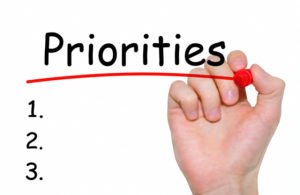Using Crisis Budgeting During Tight Financial Times
 Unexpected events can happen to any of us without warning. The world is an imperfect place: cars break down, people get laid off or injured, pets get hurt...and that's just the tip of the iceberg sometimes. And out of 280 of our blog readers polled, 51% of them say they don't have enough money in savings for a $1,000 emergency. So what should you do if that's your situation or if your emergency outlasts what you do have in savings? It's called crisis budgeting mode and here's how to get started:
Unexpected events can happen to any of us without warning. The world is an imperfect place: cars break down, people get laid off or injured, pets get hurt...and that's just the tip of the iceberg sometimes. And out of 280 of our blog readers polled, 51% of them say they don't have enough money in savings for a $1,000 emergency. So what should you do if that's your situation or if your emergency outlasts what you do have in savings? It's called crisis budgeting mode and here's how to get started:
Mortgage or rent
In crisis budgeting mode, you need to prioritize your expenses. That means housing expenses need to come first. From your mortgage payment to rent, homeowner’s insurance, association fees, and property taxes. Worried about missing mortgage payments? Call us at 888.577.2227 to speak with a housing counselor today.
Utilities
Pay heat, gas, electric, and water bills to prevent shut-off. For unnecessary services such as a land line telephone, cable/satellite television, internet, etc. call to see if you can temporarily suspend them. Or if you determine you can go without them to save money indefinitely, then cancel them. There are cheaper alternatives to cable that you can check out.
Food
Stick to the basics when buying groceries. Look for cheaper meals that you can have lots of leftovers with...like chili, soups, meatloaf, etc. If you buy organic, you may temporarily need to buy non-organic items to save money. Tips: plan your meals, shop with a list (and stick to it), avoid restaurants, use coupons, and use available local community food programs.
Health Care
It's important to maintain your health with medical and prescription care. Avoiding going to the doctor or not taking your necessary medications could put you even more at risk. Ask your medical provider about prescription drug discount programs, ways reduce your healthcare costs, and payment assistance programs. If you are without medical coverage, check into local community health care centers to reduce medical costs.
Insurance Premiums
Even though some may think this is the first place to cut spending as it may not seem like they're necessities, medical insurance and automobile liability insurance premiums are important. Not having those in place creates a potential liability for you. If you have a vehicle loan, collision and comprehensive insurance are essential. In most states if your vehicle is paid in full, you are only required to have liability coverage.
Secured Debts
Be sure to keep up on secured loan payments, such as car loans to avoid repossession. However, you can always ask your lender if you can pay interest only or get a forbearance, which means they will allow you to miss a payment or a few temporarily and add them to the end of the loan. Only agree to what you can afford.
Student Loans and Tax Payments
Take action by contacting your student loan lender about special payment arrangements to avoid default. There are limits to these, but often you are able to get a forbearance or deferment (temporary suspension of payments) depending on your situation. For tax issues, check out the IRS Taxpayer Advocate Service.
Unsecured Debt
Unsecured debts include any without collateral attached to them, such as personal loans, unsecured lines of credit, credit cards, old medical bills, etc. Even though you are responsible for these payments, these may have to wait until your other basic living needs (food, housing, medical care, etc) are covered. Collection calls may result if you fall behind for a few months and it will affect your credit. But it's more important that you have a roof over your head and food on the table.
It's also a good idea to call your lenders/creditors to let them know what's going on and that you intend to pay as soon as you are able. And once your financial situation improves, start paying them back ASAP. You can also check into financial counseling to determine your best repayment options with those unsecured debts.
Need help? Give us a call at 888.577.2227 for an appointment or get started online with your free financial counseling session. Enter your financial information online and a financial counselor will review your information and create an action plan specific to your situation.
